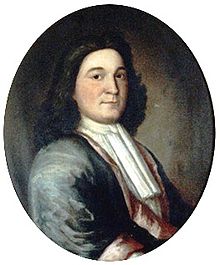Sir William Phipps
| Sir William Phips | |
|---|---|
 |
|
| 1st Governor of the Province of Massachusetts Bay | |
|
In office May 16, 1692 – November 17, 1694 |
|
| Monarch | William and Mary |
| Lieutenant | William Stoughton |
| Preceded by | Simon Bradstreet (as governor of the Massachusetts Bay Colony) |
| Succeeded by | William Stoughton (acting) |
| Personal details | |
| Born | February 2, 1650/51 Nequasset (present-day Woolwich, Maine) |
| Died | February 18, 1694/95 (aged 44) London, England |
| Spouse(s) | Mary Spencer Hull (married 1673) |
| Signature | |
| Nickname(s) | The New England Knight |
Sir William Phips (or Phipps; February 2, 1651 – February 18, 1695) was a shepherd boy born in the Massachusetts Bay Colony, a shipwright, ship's captain, treasure hunter, a major general, and the first royally appointed governor of the Province of Massachusetts Bay. He is perhaps best remembered for establishing, and later over-ruling and disbanding, the court associated with the infamous Salem Witch Trials.
Of humble origin, uneducated, and fatherless from a young age, he watched over his family's flock of sheep before apprenticing to a shipbuilder near his home in present-day Maine. He moved to Boston to start a business building ships and soon began to embark on treasure-hunting expeditions to the West Indies. He became famous in London and Boston for recovering a large treasure from a sunken Spanish galleon, a feat that earned him instant wealth and a knighthood.
In 1690, during King William's War, Phips was commissioned as a major general the same day he was first allowed to vote. He led a successful military expedition against Port Royal, the capital of Acadia, followed by an unsuccessful attempt to capture Quebec.
Two years later Phips was appointed as governor. He had successfully straddled a middle political position, cultivating a strong connection to the powerful New England minister, Increase Mather, as well as his royalist opposition on the Board of Trade. Phips and Mather returned to the Massachusetts Bay Colony from England at the height of the witchcraft delusion, after numerous executions in Salem. Phips suspended the court proceedings, pardoned several people sentenced to death, and released more than 100 being held in jail before trial. He became enmeshed in related controversies that resulted in his recall to England to answer a variety of charges. Phips died in London at the age of 44 before the charges against him could be heard.
...
Wikipedia
